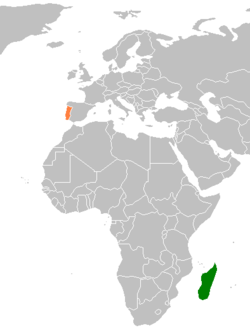Malagasy-Portuguese relations

|
|
|
|
|
| Madagascar | Portugal |
The Malagasy-Portuguese relations describe the intergovernmental relationship between Madagascar and Portugal . The countries have had direct diplomatic relations since 1960.
The bilateral relations are problem-free, although weak, with bilateral trade as the most important point of contact.
The country name of Madagascar recently gained some presence in Portugal with the success of the cartoon Madagascar (2005) and its two sequels in 2008 and 2015.
Nine citizens of Madagascar were registered in Portugal in 2015, while in Madagascar no Portuguese citizens were registered in the consular office.
history

On August 10, 1500, the Portuguese navigator Diogo Dias was the first European to sight Madagascar. He first named the island Ilha de São Lourenço .
In 1613 there was a Portuguese expedition to Madagascar, on the orders of Jerónimo de Azevedo , the viceroy of India . The expedition found the remains of a Portuguese settlement in the south of the island, who may have stranded here after one of the frequent shipwrecks off the coast. They had built a fort and u. a. a padrão made of marble and a stone cross. A 17th century chronicle mentions a massacre of these Portuguese by local tribes, but also the continued existence of mestizos from connections between the stranded Portuguese and local residents.
The fort built by these first Portuguese settlers on an island in the mouth of the Vinanibe River in front of Tolagnaro therefore existed from around 1504 to 1527. It was the first European structure on Madagascar.
In the 16th and 17th centuries, the Portuguese made further expeditions to explore the island, but without settling here. The trade routes of the Portuguese Empire led far past the island, which therefore had no major strategic importance for the Portuguese. In addition, the Portuguese seafarers found no trading centers or important trading goods here. Another important reason for a lack of Portuguese settlement were the well-fortified tribes on Madagascar. English and French attempts to settle there then also failed.
Between 1680 and 1725 in particular, Madagascar was a base for English and some French pirates, who attacked Indian merchant ships and cargo ships on the Portuguese trade route between India and Europe from here. At the same time, Europeans, especially the English and French, drove here slave trade with local tribes. However, for a long time they did not succeed in settling here permanently (see The European Colonization of Madagascar ).
During the 19th century, Madagascar came under French rule.
On June 26, 1960, Madagascar declared itself independent from France. Portugal then opened an embassy in the capital Antananarivo , in September 1960 where he became chargé João Carlos Freitas Cruz as the first representative of Portugal in Madagascar its work.
On August 2, 1963, the government of Madagascar broke off diplomatic relations with Portugal, which was now increasingly isolated internationally as a result of the escalating Portuguese colonial war . Only with the end of the colonial Estado Novo regime after the Carnation Revolution in Portugal in 1974 did the countries get closer again without opening any mutual embassies. On 27 April 1984 accredited to José César Paulouro das Neves , Portugal's representative in Mozambique , the first Portuguese Ambassador to Madagascar since the end of diplomatic relations 1,963th
diplomacy
Portugal has not had its own embassy in Madagascar since 1963 ; today the Portuguese ambassador in the South African capital Pretoria is responsible. An honorary consulate of Portugal has been set up in the Malagasy capital of Antananarivo .
Madagascar does not have its own embassy in Portugal either; its closest representations are in Paris and Rome . Madagascar has a consulate in Porto .
economy

The Portuguese Chamber of Commerce AICEP does not have a branch in Madagascar, the AICEP branch in the South African capital Pretoria is responsible.
In 2016, Portugal exported goods worth 7.115 million euros to Madagascar ( 2015 : 5.235 million; 2014 : 2.397 million; 2013 : 3.405 million; 2012 : 3.122 million), 51.9% of which were minerals and ores ( especially glassware), 29.9% metal goods, 6.6% plastics and 3.3% machines and devices.
In the same period, Madagascar delivered goods worth EUR 7.677 million to Portugal ( 2015 : 4.036 million; 2014 : 18.060 million; 2013 : 20.242 million; 2012 : 7.308 million), of which 81.8% were agricultural products (in particular Shellfish and seafood), 17.9% clothing, 0.2% wood and 0.1% leather and hides.
This made Madagascar the 111th buyer and the 103rd supplier for Portuguese foreign trade, while Portugal was the 27th buyer and the 31st supplier in Malagasy foreign trade.
Web links
- Overview of diplomatic relations with Madagascar , Diplomatic Institute of the Portuguese Ministry of Foreign Affairs
Individual evidence
- ↑ a b c Overview of diplomatic relations with Madagascar , diplomatic institute of the Portuguese Foreign Ministry , accessed on May 4, 2019
- ↑ Official alien statistics by district , Portuguese Immigration and Border Agency SEF, accessed on May 8, 2017
- ↑ Overview of Malagasy-Portuguese migration at the Portuguese scientific Observatório da Emigração , accessed on May 8, 2017
- ↑ a b A Portuguese fort in Madagascar: the fort near Tolanaro , entry at www.colonialvoyage.com, accessed on May 8, 2017
- ↑ List of the Portuguese ambassadors in Madagascar , diplomatic institute of the Portuguese Ministry of Foreign Affairs, accessed on May 4, 2017
- ↑ List of Portuguese diplomatic missions abroad , website of the Portuguese Ministry of Foreign Affairs, accessed on May 7, 2017
- ↑ Entry of the Consulate of Madagascar in Porto on www.embaixadas.net, accessed on May 7, 2017
- ↑ a b c Bilateral economic relations between Portugal and Madagascar , Excel file retrieval from the Portuguese Chamber of Commerce AICEP, accessed on May 8, 2017
